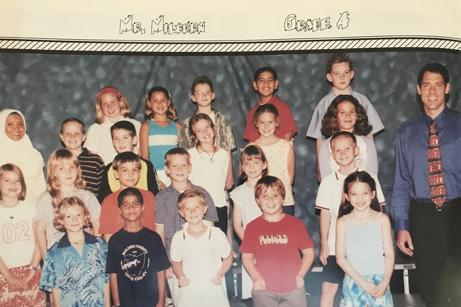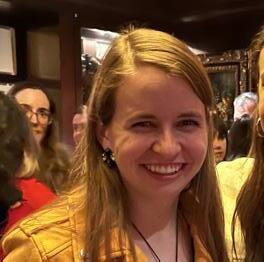
3 minute read
Alumna Emma DeCaro

Class of 2011
On SAS, ASL, and International Development
I attended Singapore American School for third and fourth grades, from 2001 to 2003, and loved every moment of my experiences there. Highlights included taking after-school Irish dance lessons, participating in the Singing Geckos choir, making art in Ms. Carolyn Braznell’s class, playing the Javanese gamelan in music class, and of course, eating Mr. Hoe’s cinnamon rolls. My teachers, Ms. Jenifer Anderson and Mr. Brian Milburn, were creative and interactive while placing a strong emphasis on our critical thinking skills—I would imagine not many third graders around the globe learned about “metacognition!” I loved the people, culture, and food of Singapore. The SEA Aquarium and Clarke Quay were some of my favorite places.
From Singapore my family moved to Austin, Texas, USA, where I graduated from high school and then pursued a bachelor’s degree in public relations. I worked for six years in communications, advertising, and nonprofit consulting, and I am now finishing a master’s degree in international development from Gallaudet University, based in Washington, D.C.
My introduction to the Deaf community came about on my first day of undergraduate classes, when I met a Deaf classmate who used American Sign Language (ASL) to communicate. We became friends, and she encouraged me to take ASL as my foreign language. Five ASL courses and three interpreting courses later, I became a state-certified interpreter and, later, a nationally certified interpreter. One of my proudest accomplishments was coordinating The Bible Recap project, a 365-day podcast that we ASL- interpreted or the Deaf community to access.
I have learned that Deaf individuals can do anything hearing individuals can do, except hear. Most Deaf community members do not view their deafness as a disability or limitation, but as an identity and culture they are proud of. Also, there is no “universal sign language”—at least 300 sign languages have been documented to date, and they are all distinct. Disability activists often advocate for “Nothing about us without us,” meaning that it is critical to include Deaf individuals and people with disabilities in all decision-making processes that impact them. This is a key area of growth and opportunity for the international development field and the primary focus of my master’s program.
Since 2017, I have been privileged to learn from and mentor a young Deaf Kurdish man living in the US. Together, we have navigated US social services, education, employment, immigration, housing, transportation, and healthcare, while I also introduced him to formal education in ASL. He did not have access to any shared sign language for the first 18 years of his life. Through his story, I realized that there were likely hundreds (if not thousands) of Kurds facing similar barriers in their homeland.
From visiting the region in 2022, I learned that with very rare exceptions, Deaf Kurds do not have the right to obtain a driver’s license, access a certified sign language interpreter, or have options to pursue higher education in Kurdistan due to limited resources. My colleagues and I hosted the first-ever regional conference at which Deaf leaders could share their challenges, hopes, and dreams for their community’s future.

Kurdistan is beautiful, with kind people, delicious food, and a unique and vibrant culture. I received a warm reception everywhere I visited and cannot wait to return. My experiences led to a seven-month internship with the Kurdistan Regional Government Representation in the United States, which became a foundational building block for my next internship in the Middle East.
From January until May 2023, I was an international development intern in Amman, Jordan with Martha EDU (www.marthaedu.com), a small enterprise dedicated to increasing literacy and sign language access for Deaf Jordanians through innovative flashcards showcasing augmented reality technology. We worked out of a small business incubator, I lived in a rental apartment 10 minutes away, and I wrapped up my degree requirements by taking three courses online. I graduated from Gallaudet University with my international development master of arts degree. on May 12, and I am now back in DC pursuing job opportunities.
I am most surprised that more resources do not currently exist to support and expand Deaf education worldwide. Martha EDU’s model and technology are easily scalable and transferable to different countries and contexts, but the biggest challenges seem to be awareness and funding. However, when governments and local organizations do not invest in their Deaf communities, their societies and economies suffer.
For SAS students, especially those who have just graduated or are approaching such a life milestone, I have two key pieces of advice, both originally from my dad. First, leave things better than you found them while enriching the lives of others along the way—whether you are working, interning, volunteering, mentoring, or just being a friend to someone. Second, don’t be afraid to invite yourself to the party. This is the essence of networking! Show up for events. Ask your parents or teachers if they know anyone at a company you’re interested in. Reach out to professionals while you are a student and request informational interviews. If an organization does not list job openings or internships, share that you would be willing to volunteer your time and skills. People are most willing to help you while you are a student, so take full advantage of this time in your life to build meaningful relationships!
In July 2022, I attended the Washington DC alumni happy hour, and it was a joy to meet and reconnect with other SAS Eagles. This is truly a special community to be part of!

By DIDI HARI KRISHNAN Communications Writer

